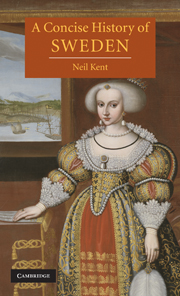Book contents
- Frontmatter
- Contents
- List of illustrations
- Maps
- Preface
- 1 From prehistory to Viking hegemony
- 2 The formation and growth of the Swedish state
- 3 The territorial consolidation of Sweden
- 4 Towards a centralist and military state
- 5 The collapse of absolutism and the Age of Freedom
- 6 Royal absolutism restored
- 7 Constitutional Sweden
- 8 The industrialisation and capitalisation of Sweden
- 9 The world wars and Swedish neutrality
- 10 Triumph of the Swedish welfare state
- Conclusion
- Appendix 1 Chronology
- Appendix 2 Monarchs and regents of Sweden
- Appendix 3 Prime ministers
- Selected further reading
- Index
- Frontmatter
- Contents
- List of illustrations
- Maps
- Preface
- 1 From prehistory to Viking hegemony
- 2 The formation and growth of the Swedish state
- 3 The territorial consolidation of Sweden
- 4 Towards a centralist and military state
- 5 The collapse of absolutism and the Age of Freedom
- 6 Royal absolutism restored
- 7 Constitutional Sweden
- 8 The industrialisation and capitalisation of Sweden
- 9 The world wars and Swedish neutrality
- 10 Triumph of the Swedish welfare state
- Conclusion
- Appendix 1 Chronology
- Appendix 2 Monarchs and regents of Sweden
- Appendix 3 Prime ministers
- Selected further reading
- Index
Summary
Sweden has long been a European country in a virtually unique position, both militarily and socially: it has avoided warfare for almost two hundred years and possesses a social welfare infrastructure that, decades ago, virtually eliminated extremes of poverty. To many, therefore, it may seem a land of milk and honey, a prosperous country in which people live in easy tolerance and harmony. The reality, though, is more earth-bound.
The Swedish social ethos which has informed its society and culture did not spring fully formed from the head of Zeus, but was moulded by the struggles, sacrifices, compromises and hard-bitten stamina of Swedes. The distillation is a society in which, at its best, the individual is expected to assume his or her civic responsibilities in the context of a highly ordered society. Individuality has its strict parameters and political strongmen rarely make headway. That said, the reigning dynasty of its constitutional monarchy was founded some two centuries ago by King Karl Johan, a powerful French field marshal and, before he changed sides, the protégé of Napoleon himself.
- Type
- Chapter
- Information
- A Concise History of Sweden , pp. ix - xiiPublisher: Cambridge University PressPrint publication year: 2008

